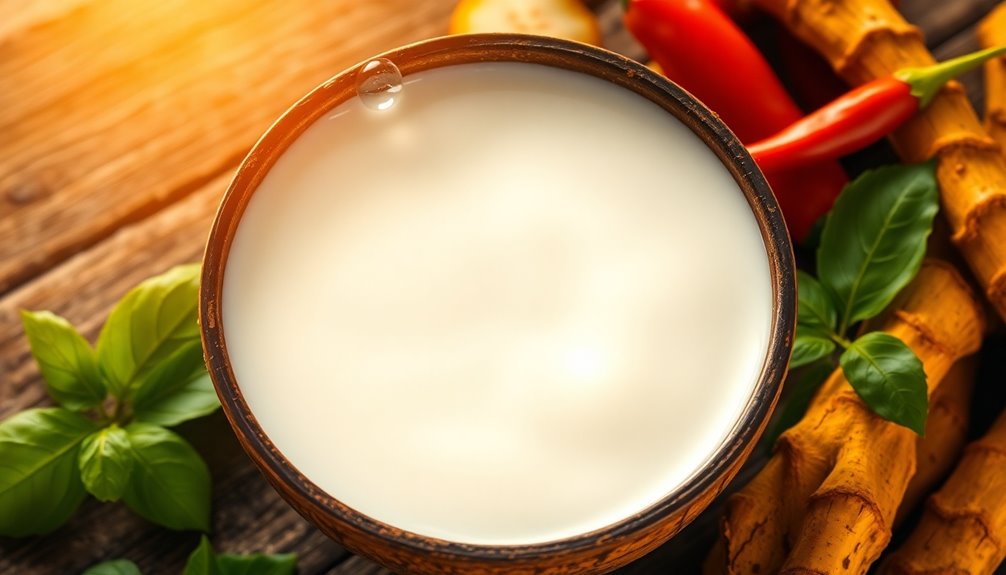Coconut milk is your go-to ingredient for achieving rich creaminess in any dish. Whether you're cooking savory curries or blending invigorating smoothies, it enhances flavors beautifully. In baking, it transforms brownies and pies, giving them a decadent texture. For dairy-free dessert lovers, coconut milk works wonders in vegan ice creams and whipped toppings. Its velvety richness makes every bite feel indulgent and satisfying. Plus, it's packed with nutrients, making it a smart choice for everyday cooking. If you're ready to access even more culinary secrets, there's plenty more to discover about this versatile ingredient!
Key Takeaways
- Coconut milk adds a rich, creamy texture to both sweet and savory dishes, enhancing their overall flavor profile.
- In baking, coconut milk creates a moist and indulgent texture in desserts like brownies and custards.
- Use coconut milk in smoothies for a velvety consistency, making them more satisfying and enjoyable.
- Incorporate coconut milk into creamy soups to elevate their richness and add a unique flavor dimension.
- For dairy-free desserts, coconut milk serves as a perfect base for ice creams and whipped toppings, providing indulgence without lactose.
Benefits of Coconut Milk
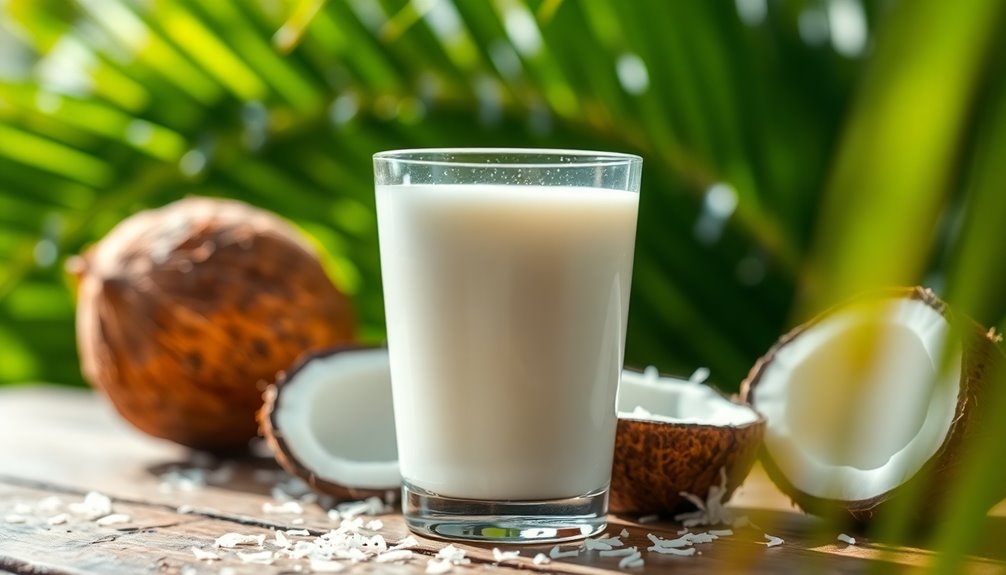
When you incorporate coconut milk into your diet, you access a treasure trove of benefits that can enhance both your health and culinary experience. This creamy delight isn't just a tasty alternative to dairy; it's packed with nutrients that your body craves. One of the standout benefits is its positive impact on your skin. Rich in healthy fats and antioxidants, coconut milk can hydrate and nourish your skin, giving it that radiant glow we all desire.
You'll find that using it in your skincare routine or as a delicious drink can help combat dryness and enhance your skin's overall appearance.
But the perks don't stop there! If you're on a journey to shed a few pounds, incorporating coconut milk can actually aid in weight loss. It's known to boost your metabolism, thanks to its medium-chain triglycerides (MCTs), which your body burns more efficiently than other fats.
Coconut Milk in Savory Dishes
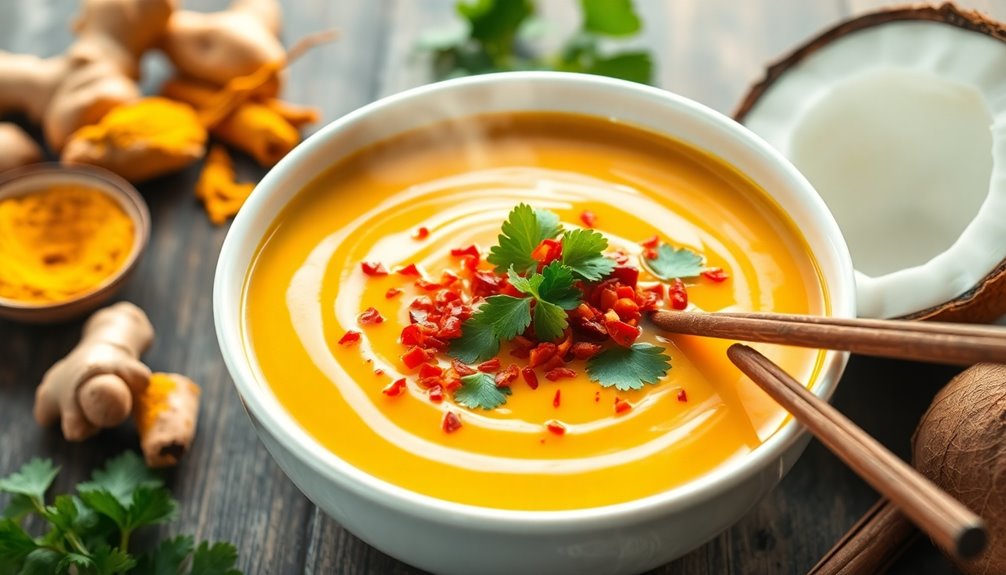
Coconut milk transforms savory dishes into rich, flavorful experiences that tantalize the taste buds. When you incorporate this creamy delight into your cooking, you're not just adding a unique flavor; you're creating a comforting embrace for your palate.
Imagine diving into a bowl of Thai curry, where the silky coconut milk melds beautifully with aromatic spices, infusing each bite with warmth and depth. You can almost feel the sun of Southeast Asia shining down on your meal, and it's a delightful reminder that you're part of something bigger—a global culinary tradition.
But it doesn't stop at curries; coconut milk is a game-changer in creamy soups, too. Picture a luscious coconut pumpkin soup, where the sweetness of roasted pumpkin dances with the creamy richness of coconut milk. Each spoonful wraps you in a cozy hug, making it perfect for sharing with loved ones on a chilly evening.
You might even experiment with different vegetables, spices, and herbs, creating your own signature dishes that bring people together. Whether you're hosting a dinner party or enjoying a quiet night in, the inclusion of coconut milk elevates your savory creations, inviting everyone to savor the moment.
Coconut Milk for Baking
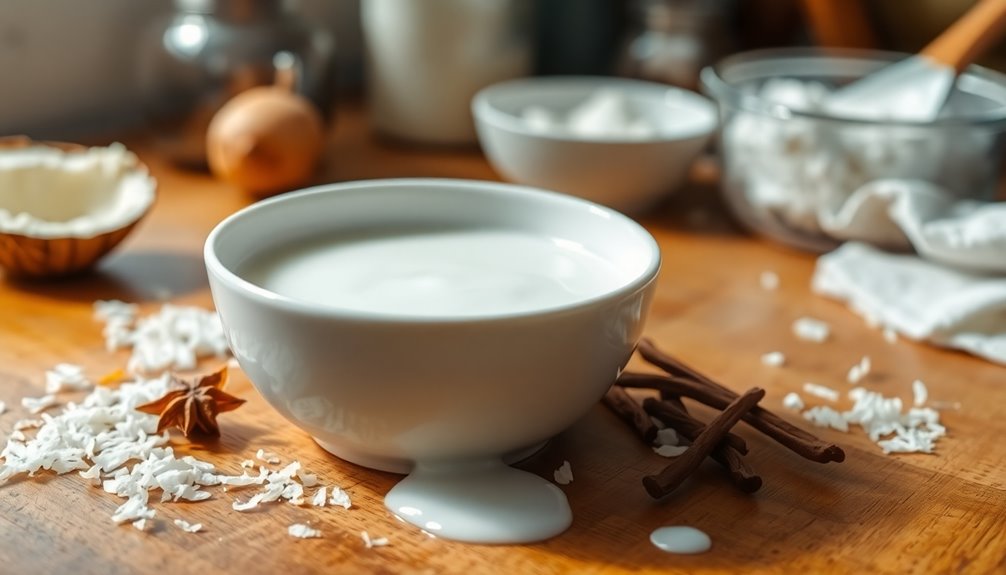
Baking with coconut milk opens up a world of possibilities, transforming your favorite recipes into delightful treats infused with a tropical twist. Whether you're whipping up cakes, muffins, or pancakes, coconut milk serves as a fantastic baking substitute that adds a rich creaminess you won't forget. Imagine biting into a moist coconut cake or fluffy pancakes, each bite bursting with flavor while still feeling light and airy.
When you replace dairy milk with coconut milk, you not only enhance the taste but also embrace a dairy-free option that welcomes everyone to your table. This makes your baking more inclusive, allowing friends and family with dietary restrictions to indulge in your creations. Plus, coconut milk pairs beautifully with a variety of flavors—think chocolate, vanilla, or even citrus.
If you're searching for recipe inspiration, try using coconut milk in your favorite brownies for a fudgy texture or in a custard for a silky finish.
You might also consider coconut milk in pie fillings or bread puddings, where its creamy texture can elevate the dish to new heights.
Smoothies and Beverages
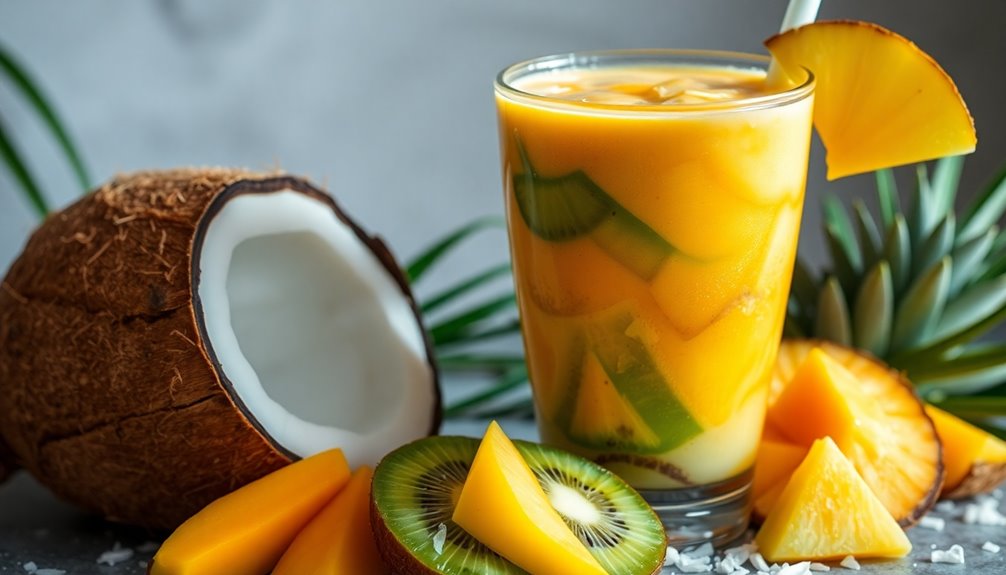
Have you ever wondered how to elevate your smoothies and beverages to a whole new level of creaminess? Coconut milk is your secret weapon! Its rich, velvety texture adds an irresistible indulgence to everything from tropical smoothies to creamy cocktails. Imagine sipping on a revitalizing drink that transports you straight to a sun-drenched beach.
Here are some ideas to inspire your next blend:
- A luscious mango-pineapple tropical smoothie, bursting with flavor and smoothness.
- A banana-coconut concoction, perfect for breakfast or a midday treat.
- A frozen berry smoothie, swirled with coconut milk for a invigorating twist.
- A piña colada-inspired creamy cocktail, blending coconut milk with rum and fresh fruit.
- A decadent chocolate smoothie, rich and satisfying, yet dairy-free.
When you incorporate coconut milk, you're not just enhancing taste; you're creating a sense of belonging to a community that appreciates wholesome, delicious ingredients. You'll find that its subtle sweetness pairs perfectly with various fruits and flavors, making it an ideal base for your favorite beverages.
Dairy-Free Dessert Ideas
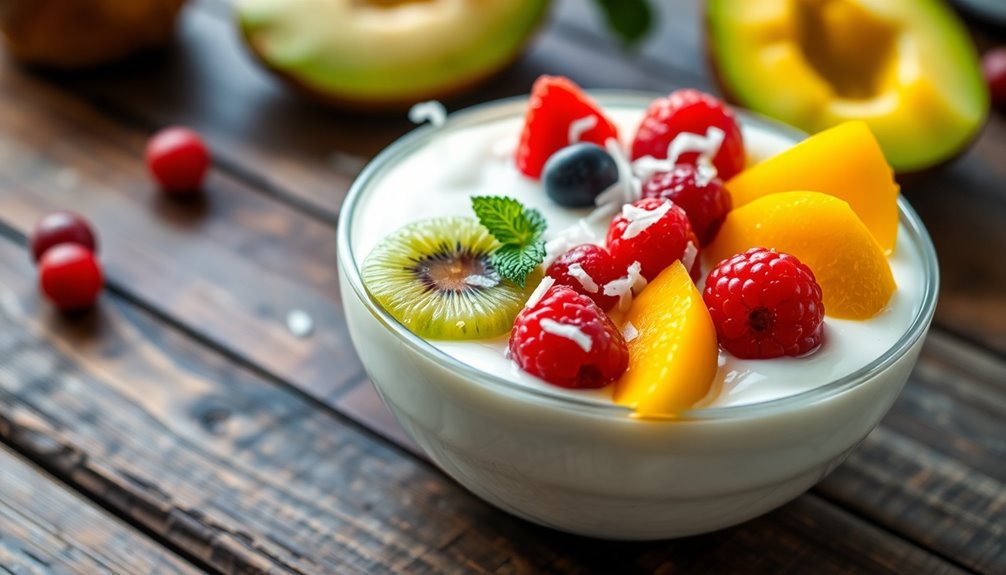
If you're looking to satisfy your sweet tooth without the dairy, coconut milk can be a game-changer in your dessert repertoire. This luscious plant-based alternative brings a rich, creamy texture that elevates your favorite treats while keeping them vegan-friendly.
Imagine indulging in a scoop of homemade vegan ice cream made with coconut milk. Simply blend together ripe bananas, a splash of coconut milk, and your favorite add-ins—like dark chocolate chips or fresh berries. Freeze it for a few hours, and you've got a delightful dessert that feels indulgent yet wholesome.
But that's just the beginning! Coconut milk also shines in the world of toppings. Whip up some coconut whipped cream to crown your desserts. To make it, chill a can of coconut milk overnight, then scoop out the solidified cream into a bowl. Whip it until it's airy and fluffy, adding a dash of vanilla and a sprinkle of maple syrup for sweetness.
This creamy topping is perfect for dolloping on fruit salads, cakes, or even spooned over warm brownies.
With coconut milk, you can create a range of dairy-free desserts that bring everyone together. Whether you're hosting a gathering or simply treating yourself, these ideas foster a sense of belonging and shared joy. Embrace the delicious possibilities of coconut milk, and let your desserts make a statement that's both rich in flavor and kind to the planet.
Tips for Cooking With Coconut Milk
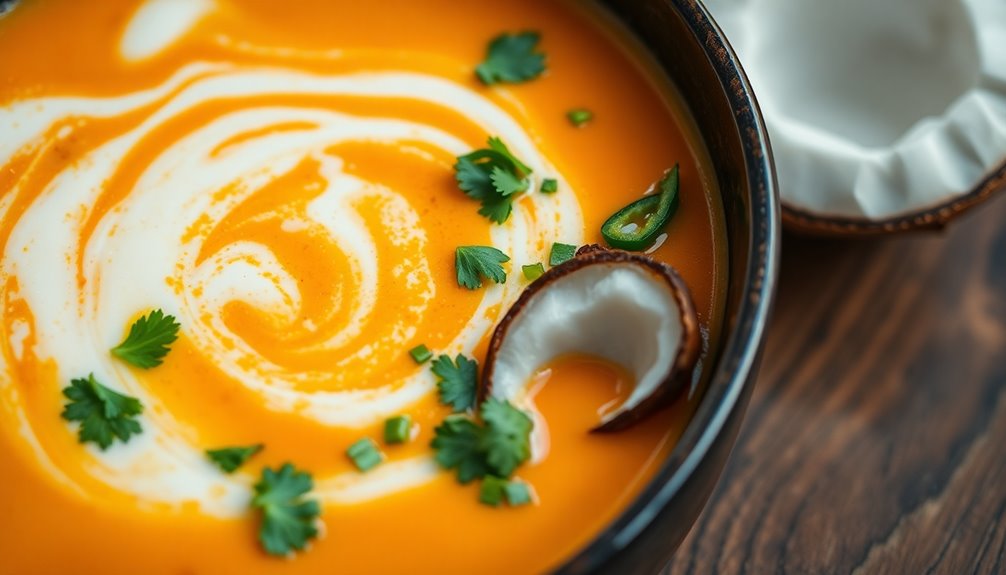
Coconut milk is a versatile ingredient that can elevate both savory and sweet dishes in your kitchen. Whether you're whipping up a creamy curry or a luscious dessert, using coconut milk can bring richness and depth to your meals. Here are some tips to help you make the most of this delightful ingredient:
- Choose the right type: Use full-fat coconut milk for a richer texture, and light coconut milk for a lighter option.
- Balance flavors: Coconut milk can be sweet or savory, so be sure to season it well with spices and herbs to enhance your dish.
- Explore substitutions: If you're out of coconut milk, try using almond milk or cashew cream, but keep in mind that this may alter the flavor and consistency slightly.
- Incorporate cooking techniques: When simmering, let the coconut milk meld with your ingredients for richer flavors; don't rush it!
- Use it in baking: Coconut milk can replace dairy in cakes, muffins, and puddings, adding a unique flavor and moistness.
Frequently Asked Questions
Can I Use Canned Coconut Milk Instead of Carton Coconut Milk?
Absolutely, you can use canned coconut milk instead of carton coconut milk! In cooking applications, canned coconut milk often provides a richer, creamier texture. You'll notice a taste comparison too; canned tends to have a more intense coconut flavor, while carton versions are usually lighter.
This makes canned milk perfect for curries or desserts, adding depth and richness. So, grab that can and elevate your dish with delightful coconut goodness!
How Do I Store Leftover Coconut Milk?
You've just opened a magical can of coconut milk, and you can't let it go to waste!
For storing tips, pour any leftovers into an airtight container and pop it in the fridge. It'll stay fresh for about a week.
If you want to get adventurous with recipe substitutions, freeze the leftovers in ice cube trays, so you've got coconut milk ready for your next culinary creation.
Enjoy the tropical delight whenever you crave it!
Is Coconut Milk Suitable for People With Nut Allergies?
If you've got a nut allergy, you'll be glad to know that coconut milk is a safe alternative. Unlike tree nuts, coconuts aren't classified as nuts, making them suitable for most people with nut allergies. Just be cautious and check for any cross-contamination in processing facilities.
Exploring alternatives like coconut milk can open up new culinary adventures while keeping your allergies in mind. Enjoy the creaminess without worry!
Can I Substitute Coconut Milk for Heavy Cream in Any Recipe?
Yes, you can definitely substitute coconut milk for heavy cream in many recipes! It's a fantastic dairy alternative that adds richness and flavor. When you're making recipe modifications, just keep in mind that coconut milk may alter the texture slightly, but it'll still create a deliciously creamy dish.
Whether you're whipping up soups, sauces, or desserts, using coconut milk can help you achieve that satisfying creaminess while keeping things dairy-free and inclusive for everyone!
What Is the Shelf Life of Coconut Milk?
Like a delicate flower, coconut milk thrives under the right conditions. Its shelf life varies: unopened cans can last 2-5 years, while opened coconut milk needs refrigeration and should be consumed within 4-7 days. If you can't use it all, freezing options are available; just pour it into ice cube trays for easy future use. By storing it properly, you guarantee that your culinary adventures remain both delicious and delightful!
Conclusion
Now that you know the versatile uses of coconut milk, envision the tempting flavors and creamy textures you can craft in your kitchen. Whether you're preparing a flavorful curry or mixing a invigorating smoothie, coconut milk can elevate your dishes to new levels. But wait—there's more! What if you could astonish your friends with a dairy-free dessert that doesn't compromise on indulgence? Immerse yourself in the world of coconut milk and reveal a domain of culinary possibilities you never knew existed!

